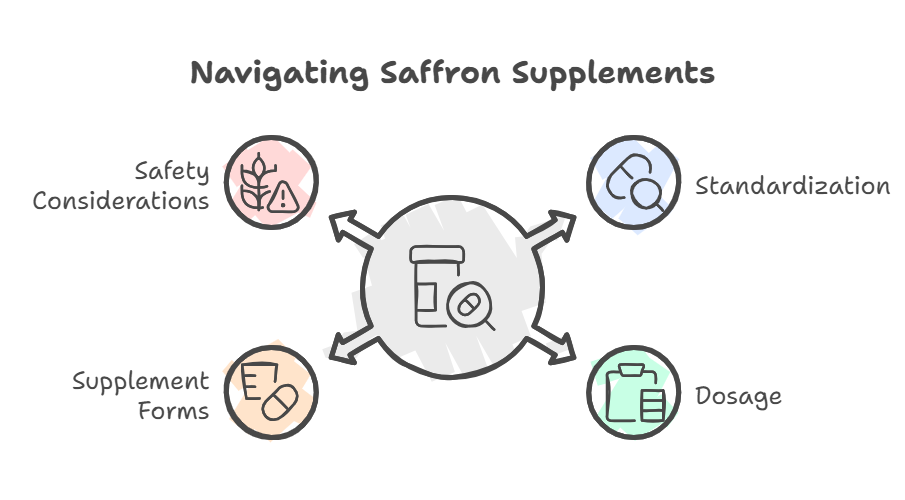You might be wondering what all the buzz is about saffron, and why people are looking for the best saffron supplement. This vibrant spice, derived from the Crocus sativus flower, isn’t just for adding color and flavor to your paella. Saffron has been used in traditional medicine for centuries1.
Finding the best saffron supplement for you means looking beyond the bright color. You’re probably looking to add this into your diet as well, so there will be options that match.
What Makes Best Saffron Supplement So Special?
Saffron gets its properties from compounds like crocin, picrocrocin, and safranal. These aren’t just fancy words. These compounds are what give the spice its potential effects.
Beyond cooking, saffron has found its way into supplements. People use them hoping for various perks, from elevating their mood to supporting weight management. Although more research is needed, you need to make a decision.
Saffron’s Impact on Mood and Mental Wellness
Feeling down? Some small scale studies point out to saffron as helping to support improving mood and fighting depression. Interestingly, the spice seems to affect the brain and the way serotonin production is made.
“Research suggests that saffron may have antidepressant properties comparable to conventional medications, making it a promising natural alternative for mood support.”
Dr. Adrian Lopresti
There have even been comparisons between the effects of best saffron supplement extract with commonly known pharmaceuticals for mood disorders. Imagine a natural spice potentially offering similar relief with potentially minimal side effects. Although there needs to be additional information, a number of people take it to try and see how it works in their daily routine.
Saffron and Cognitive Function
We all have moments of forgetfulness. Some studies suggest saffron might help, especially in individuals experiencing mild cognitive impairment.
While best saffron supplementation may not stop the disease completely, there’s interest2 in the effect on Alzheimer’s disease. There isn’t sufficient proof that supports that these could fully help, so people try smaller amounts first.
Beyond the Brain: Other Potential Benefits of Saffron
Saffron’s story doesn’t end with the mind. Its antioxidant properties are thought to combat oxidative stress in the body, potentially benefiting heart disease prevention.
For women, saffron might offer a natural solution to menstrual problems. Research on its effects on sleep continues, exploring its potential for alleviating sleep disorders like insomnia. This also applies to improvements in premenstrual syndrome (PMS) symptom severity and frequency.

Choosing the Best Saffron Supplement
With so many options, finding a quality supplement requires a thoughtful method. Here’s what to look for when buying saffron to help enhance your health. Dosage of extract are not created equal, with best saffron supplement differing widely.
Understanding Saffron Extract Standardization
Look for products that specify the amount of active compounds. Ideally, the key ones are crocin, picrocrocin, and safranal.
This info isn’t always readily available. But finding a brand that values transparency is a great starting point.
Dosage: Finding What Works for You
Research suggests a typical daily dose is around 30mg of saffron extract, divided into two doses. Higher doses have been studied. There’s information, although still growing, that discusses 100 mg as an acceptable daily dose, too.
Start low, and see how your body reacts. The amount it takes can differ for a range of reasons for various individuals. Consider tracking your experience in a journal to document how it is working3.
Forms of Best Saffron Supplements
Best saffron supplements come in capsules, tablets, and even liquid forms. You may also wonder if adding the actual saffron spice to your cooking provides the same effect.
It does take quite a bit of the spice to match the concentrated extract you’d find in a high-quality saffron supplement. For convenience, most people find capsules or tablets the easiest to use.
And if you’re looking for a simple way to get the benefits of best saffron supplement without the hassle of measuring or cooking with saffron daily, I came across something that does the job well—these 100% pure saffron extract capsules. They’re an easy, no-fuss option, and the quality looks solid.
Possible Side Effects and Safety Considerations
Saffron, as food, is generally considered safe. However, high doses as supplements may cause problems. Drowsiness and upset stomachs, have all been discussed as reasons why it’s better to stay lower when starting out. But 12 to 20 gram doses have a negative history as well.
It’s always recommended to have your healthcare provider on-board with adding new things to your routine. Be especially aware if you’re taking other drugs, or have pre-existing conditions. Don’t do this alone, because other issues, like heart complications or medication interactions, need to be accounted for.
If surgery is coming up, this also might be a bad idea, but ask about how this might help after. Some supplements contain fillers. So those with food intolerances may need to stay away entirely, depending.
Different Brands and Quality of Best Saffron Supplements
Best saffron supplement market can be tricky to figure out. Not all products are created equal, as mentioned.
Do your homework and research different brands of best saffron supplement. Reputable brands, but always check third-party testing or certifications for any of the choices.
The Role of Saffron in Traditional Medicine and Modern Research
Saffron has a very extensive history that goes way back. It’s more than a luxurious culinary spice. It goes back over three thousand years.
From treating digestive issues to working through respiratory conditions, traditional systems saw multiple purposes for this item. Some of that is carrying over in the ways they are using it now. Modern research, including clinical trials, aims to bring validation on saffron in the ancient context4.
Modern research is still in its early stages, exploring saffron’s potential in areas like:
- Mental health: Investigating its effects on depression, anxiety, and even bipolar disorder.
- Eye health: Examining its potential role in conditions like macular degeneration. Some studies, such as those published in Investigative Ophthalmology & Visual Science, are exploring this.
- Cancer research: While very preliminary, there’s some interest in saffron’s potential effects on cancer cells, including breast cancer and pancreatic cancer.
It is important to note the work published in journals like BMC Complementary and Alternative Medicine (often abbreviated as BMC Complement Altern Med or BMC Complement Altern). It emphasizes the need for more rigorous randomized controlled trials. Also to fully understand saffron’s therapeutic potential and mechanisms.
Key Compounds in Saffron
The power of saffron is largely from a few main active compounds:
| Compound | Description |
|---|---|
| Crocin | Responsible for saffron’s vibrant color, it is powerful for antioxidants. |
| Picrocrocin | This is a bitter compound. This one is all about the flavor of the spice. |
| Safranal | This creates that classic saffron aroma. This volatile oil may also impact the nervous system. |
Studies, such as some in Graefes Archive for Clinical and Experimental Ophthalmology (sometimes referenced as Graefes Arch Clin Exp Ophthalmol or just Graefes Arch) often highlight the specific concentrations of these compounds. Those studies will also break it down in the saffron extracts being tested.
For those interested in the clinical pharmacology aspects, journals like Clinical Pharmacology & Therapeutics (often shortened to Clin Pharm Ther or Clin Pharm) may offer insights into how saffron interacts with the body.
The understanding is that the way saffron works is multifaceted, impacting several bodily systems at once. Saffron has been researched by the Journal of Food Chemistry for the ability to act as a natural coloring agent5.
This includes interactions with neurotransmitters, inflammatory pathways, and cellular processes. Remember that saffron, often referred to as saffron crocus, is the focus of study. And also the derived Crocus sativus extract (sometimes shortened to sativus extract) used in supplements is under investigation as well.
Frequently Asked Questions
Which is best saffron supplement?
There isn’t a single “best” brand universally. Finding the best saffron supplement choice requires personal effort, due to a lot of different types. Quality can differ greatly. It depends on where the ingredients come from. It also matters how they are extracted. Finally, the manufacturer’s goal of standardizing active compounds plays a role. Look for brands that offer transparency, third-party testing, and clear labeling. Remember that free shipping doesn’t always mean high quality.
Who should not take saffron supplements?
Pregnant women should avoid saffron supplements. Larger-than-food amounts of saffron can be really bad for an unborn baby. Others with existing allergies to similar plant species, could potentially react negatively. If you’re on blood pressure or diabetes meds, be careful. Saffron may interact with these medications. Always read the full privacy policy of any supplement you decide to purchase. Consider how guidelines may affect different groups. This includes children’s health, teen health, women’s health, and pet health. Each has unique safety needs.
Conclusion
Choosing the best saffron supplement is more than just grabbing the first bottle you see. It’s about finding what fits your health goals, tolerance, and likes. It involves making sure of a product’s quality, potency, and origin.
Keep in mind that the saffron story continues. If you take your time, you’ll be more likely to find the best outcome.
Small Step, Big Impact
Incorporating saffron into your daily routine may offer various health benefits, including mood enhancement and cognitive support. Start with a daily dose of around 30mg of a standardized extract, and consult your healthcare provider to ensure it’s appropriate for your individual health needs.
Listen to this article
This is an AI generated Podcast version of the article.
- https://www.mdpi.com/2223-7747/11/3/281[↩]
- https://www.webmd.com/vitamins/ai/ingredientmono-844/saffron[↩]
- https://pmc.ncbi.nlm.nih.gov/articles/PMC8387890/[↩]
- https://apps.who.int/iris/bitstream/handle/10665/206025/B0104.pdf[↩]
- https://www.researchgate.net/publication/346084697_Saffron_as_a_natural_food_colorant_and_its_applications[↩]



